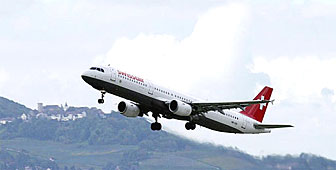Aid to Swissair lands government in legal minefield

Government aid for Swissair has put Bern on a potential collision course with the European Union.
Swiss government officials privately admit they are on thin ice legally in their attempts to salvage the national airline, Swissair, which is technically bankrupt.
The government has already pumped some SFr450 million ($273.8 million) into the carrier, and is expected to provide more cash when it meets to discuss the issue next Monday.
EU rules prohibit governments from sustaining airlines financially and following the signing of a bilateral agreement between the union and Switzerland, Bern is required to fall into line with EU law.
The agreement contains the same principles on state aid as Articles 87 and 88 of the EU’s Amsterdam treaty. Article 13 of the Swiss-EU agreement spells out that state aid “in any form whatsoever which distorts or threatens to distort competition […] shall be incompatible with this Agreement”.
The agreement also stipulates that any government action that might be in conflict with the agreement must be submitted to the EU commission for consideration.
The EU’s transport commissioner, Loyola de Palacio, has criticised the Swiss government for not informing Brussels before it approved the SF450 million credit for Swissair.
Do EU rules apply?
The Swiss economics minister, Pascal Couchepin, has suggested that EU rules don’t apply since the Swiss-EU agreement is not yet in place.
The agreement was signed in 1999 together with six other bilateral treaties. It is expected to enter into force in January 2002, once it has been ratified by all EU member states.
Following Couchepin’s remark, Switzerland has accepted that it is bound by international law not to pursue policies that run counter to agreements already signed.
Moreover, the state aid to Swissair under discussion, which could be in the region of SFr2 billion, is needed to support the airline until April next year, by which time the Swiss-EU agreement should be in force.
Limited airline support
EU governments have given support to their airlines in the wake of the September 11 attacks, but this was restricted to compensation for costs incurred during the four days when air traffic was grounded in the US, as well as increased insurance premiums.
The aid which the Swiss government is considering for Swissair is “something different altogether”, said an expert close to Switzerland’s relations with the EU.
If the government is not to contravene EU law by supporting Swissair, its intervention must fall outside what is considered state aid, or be within the exemptions the EU allows.
For aid to qualify for an exemption it must comply with strict rules: it must be “one time, last time”, it must be accompanied by a restructuring plan, and the airline concerned is prohibited to use public funds to extend its capacities.
Legal issue
Officials in Brussels declined to comment on whether Swiss aid would contravene EU law. “We’d obviously have to study the Swiss government proposal first”, a spokesman for the commission, Gilles Gantelet, told swissinfo.
But Gantelet said that, as a rule of thumb, public money needed to take the form of a commercial investment if it was to be legal.
If the investment came in the form of a loan, interest rates should be not lower than average market rates, Gantelet said. If it came in the form of equity shares, the government “must give evidence that it has acted as any private investor would, which means that the possibilities for profitability exist in the short-term.”
Gantelet hinted that Switzerland would have a better chance of passing the EU’s test if public money was invested in a new company rather than paid to the “old” Swissair.
“There are more opportunities to treat [an investment] as something other than state aid if it goes to a new company rather than when it goes to an existing one that is in a bankruptcy situation.”
But Gantelet refused to speculate on whether Switzerland would breach the “one time, last time” rule if the government helped to start up a new airline.
Swiss government officials say a number of EU member states which would like to prevent their own carriers from going bankrupt were hoping that the Swiss rescue operation would set a precedent within the EU.
The Belgium government had to intervene recently to save the Sabena fleet from being grounded, and similar difficulties are reported at Ireland’s Aer Lingus and Greek’s Olympic Airways.
But Gantelet poured cold water on any hope that interventionist policies might also curry favour with the EU commission. “Certain rules were decided by all countries including Switzerland when it signed the bilateral agreements, and as guardians of the treaties the Commission must ensure that these rules are applied”, he said.
by Markus Haefliger

In compliance with the JTI standards
More: SWI swissinfo.ch certified by the Journalism Trust Initiative
You can find an overview of ongoing debates with our journalists here. Please join us!
If you want to start a conversation about a topic raised in this article or want to report factual errors, email us at english@swissinfo.ch.